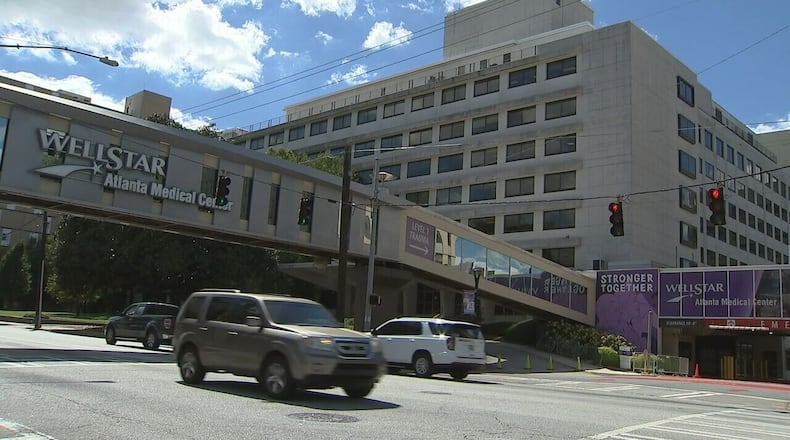With the closure of Atlanta Medical Center growing ever nearer, DeKalb County could send $8 million in additional funding to Grady Memorial Hospital — and $11.9 million more to expand and improve services at Emory Hillandale Hospital.
DeKalb CEO Michael Thurmond announced the proposal Tuesday morning, a day after Atlanta Medical Center started diverting ambulances to other facilities. Wellstar Health System plans to close the longtime downtown Atlanta hospital by Nov. 1, with the emergency department shuttering by Oct. 14.
The closure stands to strain nearby hospitals like Grady, Emory Midtown and Piedmont the most. But 20-30% of AMC’s patients are generally DeKalb County residents, and Thurmond has vowed to do whatever’s possible to help offset the impact.
That includes his new proposal for Emory Hillandale, a hospital about 18 miles east of AMC in Stonecrest. The facility opened in 2005 and became part of the Emory Healthcare system in 2018.
The expansion will not make Emory Hillandale a Level I trauma center, a designation meaning it’s equipped to care for the most urgent victims of violence, car crashes and brain trauma. Upon AMC’s closure, Grady will be the Atlanta area’s only such facility.
Officials hope, however, that the expansion of 100-bed Hillandale could reduce the flow of non-Level 1 patients to Grady.
“This is the reality that we face, and consequently we have to go forward,” Thurmond said. “Wellstar is not going to retract its decision.”
Under the CEO’s proposal, the $11.9 million allotment for that hospital would be distributed as follows:
- $4.7 million to expand the emergency room by up to 15 “bays.”
- $4.5 million to renovate the hospital’s second-floor intensive care unit.
- $1.7 million to replace the hospital’s CT scanner.
- $1.1 million create a new Hillandale Trauma Recovery Center, a “hospital-based violence prevention program that will employ 10 specialists, including psychologists, outreach workers and behavioral health specialists, devoted to violence prevention and trauma recovery.”
- A $250,000 grant to a nonprofit “that will inform and encourage eligible uninsured residents to register for American Affordable Care Act, Medicaid and other subsidized insurance coverages.”
Emory Healthcare interim CEO and president Dane Peterson and other representatives from the hospital system attended the virtual county commission meeting were Thurmond announced the proposal. They expressed support for the idea.
“Hillandale has outgrown its capacity,” Dr. Bryce Gartland, Emory’s hospital group president, said.
DeKalb, meanwhile, already sends millions to Grady annually. This year’s regular contribution is scheduled to be $22.2 million. The additional $8 million allotment proposed on Tuesday would help address the hospital’s operating deficit, which was driven up by the high cost of using contract nurses during the pandemic.
State officials have also pledged a $130 million contribution to help Grady expand its operations in the wake of AMC’s closure. But that work is likely to take at least two years.
Thurmond is hopeful an expansion at Emory Hillandale could provide shorter term relief, though a specific time frame was not available. Gartland said that, if approved, work to expand the emergency department in particular would begin as soon as possible.
“I think we’ll strengthen the entire health care safety net in metro Atlanta,” Thurmond said. “Particularly in the east metro.”
As proposed, the $8 million for Grady would come from the county’s federal American Rescue Plan Act funds. The Emory Hillandale expenditures would include about $3 million from ARPA and $8.9 million from the county’s general fund reserves.
The three-member committee of county commissioners providing initial consideration of the proposals met Tuesday afternoon. Commissioner Jeff Rader raised questions about spending the money without more information. He called the would-be expenditures for capital improvements at Hillandale “a pig in a poke.”
Thurmond defended Emory by saying he had solicited the proposal, not the other way around.
Rader then proposed using ARPA funds for the whole allotment rather than pulling from the county’s reserves. Committee chairman Larry Johnson initially seemed intrigued by the idea but nobody seconded Rader’s substitute motion.
The items ultimately passed out of committee as proposed, with Rader abstaining.
They could come before the full board for a final vote next week.
“We’re in the situation now where it will affect people’s lives,” Commissioner Mereda Davis Johnson said. “And so we must step up to the plate.”
About the Author
Keep Reading
The Latest
Featured


